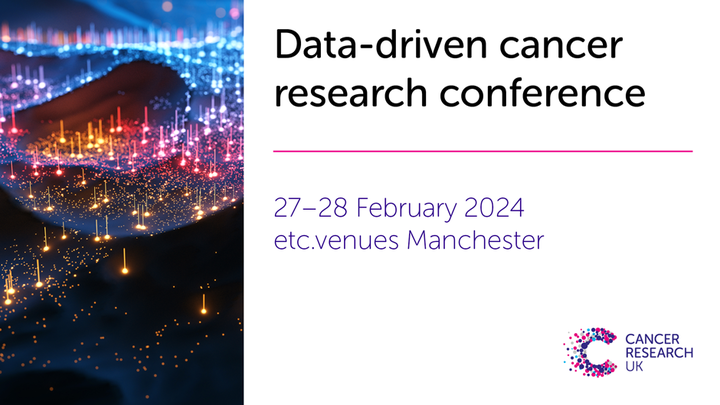Insights from the Data Driven Cancer Research Conference in Manchester

From February 27th to 28th 2024, I had the privilege of attending the Data Driven Cancer Research Conference held in Manchester. The event brought together clinicians, researchers, data scientists and patient advocates from various fields to discuss the latest advancements and challenges in leveraging data for cancer research. Among the attendees were five members of our Wedge Lab team: Laura, Aliah, Chris, Marian, and Miaomiao. It was an enlightening experience, filled with insightful talks and engaging discussions.
Team Participation:
Four members of our team had the opportunity to present posters at the conference, showcasing our ongoing research and findings. This active involvement allowed us to share our work with fellow researchers and receive valuable feedback, contributing to the collaborative spirit of the event.
Humanising Data:
One of the recurring themes throughout the conference was the importance of acknowledging the human aspect behind the data. Several talks emphasised the significance of considering the patients’ perspectives, experiences, and needs in cancer research. By recognizing the individuals behind the data points researchers can develop more patient-centric approaches and improve outcomes.
The Need for Implementation Strategies:
Prof. Florian Markowetz underscored the discrepancy between the wealth of innovative models generated through academic research and their limited integration into real-world clinical practices. While these models may demonstrate significant clinical potential, their impact remains unrealised due to challenges in implementation. Florian made a few observations: 1) Success in academia is not the same as success in the clinic – academic success is measured in publications, grants and impact factors, but the clinical success of your model is measured differently: How often is it being used in how many hospitals?; 2) Successful models use data that are available in routine practice- There are large academic collections such as TCGA, and Genomics England, but in clinical reality are an H&E slide and some DNA; 3) Successful models are linked to actions; 4) Successful models are implemented outside of centres of excellence – we need to find out if doctors elsewhere find our tool useful, and how well it fits into different clinical pathways and decision procedures. So Florian emphasised the need to have a model implementation plan - this could be by including a section on implementation into the discussion of every translational paper.
Noteworthy Talks:
Numerous talks stood out for their profound insights and thought-provoking discussions. Speakers highlighted innovative methodologies, cutting-edge technologies, and promising research findings. Of particular interest was the emphasis on integrating diverse datasets, including genomic, clinical, and patient-reported data, to gain a comprehensive understanding of cancer biology and improve treatment strategies. Also noteworthy - the importance of integrating real-world evidence.
The Value of Real-World Evidence in Informing Clinical Practice:
Professor Corinne Faivre-Finn gave the keynote address. Her presentation challenged the conventional notion of relying solely on data from clinical trials for cancer research and clinical decision-making. She argued that criteria for selecting patients for clinical trials may be too rigid and would fail to capture the complexities of real-world patients that clinicians would treat daily. Faivre-Finn highlighted the potential of real-world evidence data to inform clinical practice across cancer care. From guiding treatment decisions to evaluating comparative effectiveness and monitoring long-term outcomes, real-world evidence offers actionable insights that can enhance patient care and optimize healthcare delivery. By tapping into real-world data sources, researchers and clinicians can gain a deeper understanding of disease trajectories, treatment responses, and patient preferences, ultimately improving outcomes and quality of life for cancer patients
Advocacy for Transparency:
A notable presence at the conference was UseMyData, an organisation advocating for transparency and active communication regarding the use of patient data in research. Their representatives underscored the importance of involving patients in decision-making processes and ensuring their consent and privacy rights are respected. The patients that have donated their data want to know how their data is being used, and how it has progressed cancer research. This call for transparency resonated deeply with attendees, sparking discussions on ethical considerations and best practices in data management.
Key Takeaways:
Attending the Data Driven Cancer Research Conference was an enriching experience that provided valuable insights and networking opportunities. It reinforced the significance of interdisciplinary collaboration, ethical data handling, and patient-centred approaches in advancing cancer research. As members of the Wedge Lab, we are inspired to continue our efforts in leveraging data-driven approaches to contribute to the fight against cancer.
Conclusion:
The Data Driven Cancer Research Conference in Manchester served as a catalyst for innovation, collaboration, and advocacy in the field of cancer research. By bringing together researchers, patient advocates, and clinicians, the event facilitated meaningful discussions and propelled the advancement of data-driven approaches to combat cancer. As we reflect on our participation in the conference, we are committed to furthering our research efforts with a renewed focus on humanising data and prioritising patient outcomes.